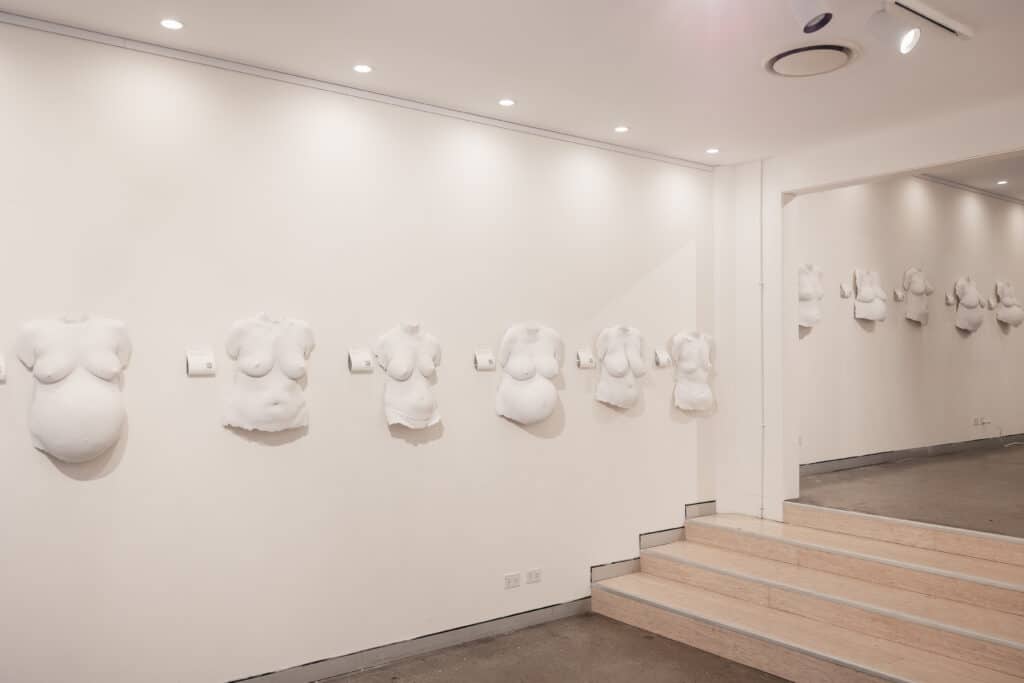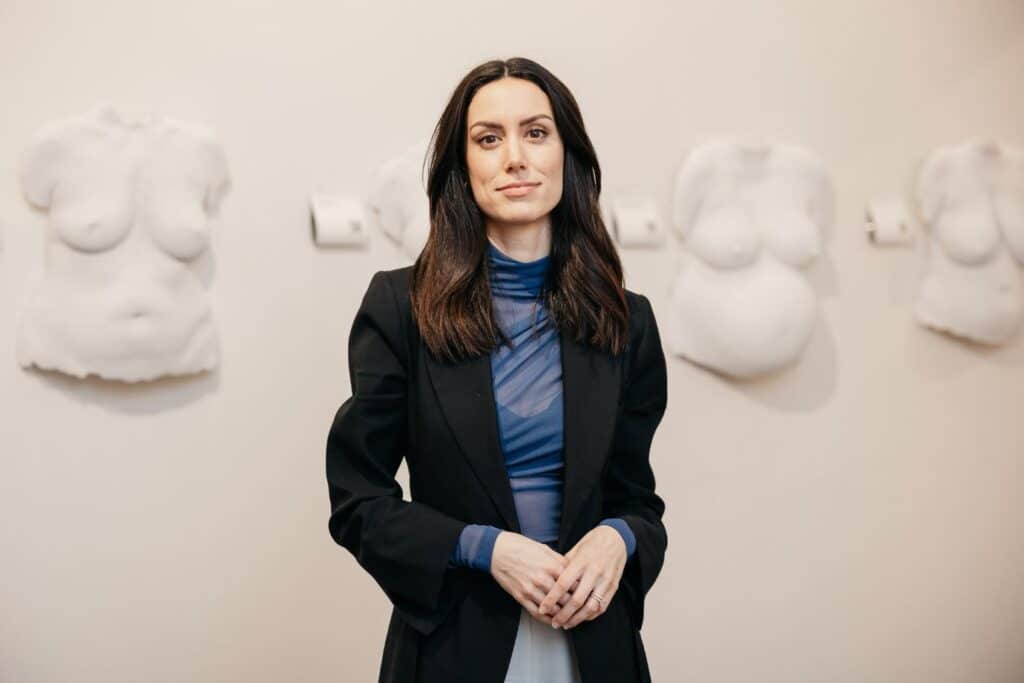There are still so many taboos surrounding the female body. It’s time that we tackle women’s reproductive health as a whole – including fertility, pregnancy, birth and postpartum.
We don’t often speak openly of the experiences that women go through along their motherhood journey. Whether it’s IVF struggles, birth trauma, pregnancy loss, lack of postpartum care and breastfeeding support, or mental health issues. These experiences are incredibly common and it’s only by talking about our challenges that we can bring change.
Bare Mum, a pioneering Australian brand at the forefront of women’s postpartum care, unveiled its latest campaign, the “Wall of Wombs” exhibition over the long weekend.
The Wall of Wombs is an empowering exhibition featuring 24 life-size casts of women’s torsos, representing the diverse and dynamic forms of motherhood. Each cast is paired with powerful audio narratives sharing personal and poignant journeys of the mothers represented.
The aim for this exhibition is to provide a platform for women to feel supported, to be educational, and to spark a much-needed conversation that hopefully will ignite change.
The inspiration behind Bare Mum stemmed from a deep-rooted belief that every woman’s journey to motherhood is unique and deserves to be celebrated.
When I started Bare Mum just over two years ago, I was surprised by how many people asked me why I would want to work in this field, not having children myself. The truth is, there is so much that we don’t know, we don’t see of a person and their journey in life.
With this campaign, I wanted to challenge people’s perception of what it means to be a mother. Is it the person who carries life, or the one who raises a child? Is it the woman who births a baby, or the one who loves, nurtures, and cares? There are so many different layers to motherhood, and I wanted to represent the many unique journeys it takes us on.
Motherhood can look so different from one person to another and yet, it can be so relatable. Here, we spotlight two women whose stories are shared on the Wall of Wombs along with 22 others.

Marie’s Story
I’m 35 years old in a few months, I’m married, I live in Sydney, and I’m a creative. We began trying in December 2019, and we have one angel baby and our daughter born in October 2023, both were conceived via IVF. Becoming a mother felt continually trying. Whilst I outwardly worked, studied, and appeared to function in the world, privately those years overflowed with heartache. I cried often, mostly after opening social media and seeing pregnancy announcements. I would curl up into a ball and sob into my husband’s cocooned body.
I have great respect for modern medicine and all of the options we currently have in the fertility space. However, it is so hard to navigate what to do and when. There is a sense of constantly having to make big decisions, some hugely unaffordable, whilst living with the emotions and the unknowns of trying to fall pregnant. For me, I felt reading and asking questions were the only actions I had control of in what felt like such an out of control journey.
Also, I knew every doctor, specialist, or midwife appointment was limited in time, I assumed there was a large number of people they would be supporting every day, and that most likely there would only be a short time before and after the appointment where they could focus their attention on our protocol and what was next. I didn’t view this negatively, I framed this as a way to empower myself and to always come prepared with questions. That way I could use my providers as a collaborative resource. Where did I find those questions, I asked friends and family, I read research, and I followed people on social media who had shared their stories. I also changed IVF providers from private to public. Though the main decision was monetary, it was also because I didn’t feel acknowledged or supported by the doctor we saw. Getting another opinion gave me confidence to follow my own intuition and also to do what was best financially for our family.
I can only speak to my own experience, and what was particularly striking for me, was that it was only through unexplained infertility and where I was at on my IVF journey that drove me to advocate for surgery to check for endometriosis. When you try so many things it’s hard to know what has worked. In saying that I fell pregnant for the first time ever on the IVF transfer 6 weeks after my endometriosis was removed.
Brooke’s Story
I am 26 years of age, I come from a large family having 4 older brothers, am a first time mum and have my own beautiful family with my incredible husband Tom, the sweetest 2 year old daughter, Indi and dog Vino.
My journey to motherhood has been one of the most transformative experiences and one that is filled with a mix of emotions. Being a first time mum and also quite young being pregnant at 24 years of age, there were times where I felt overwhelmed. Whether that be shopping for pregnancy and postpartum products questioning what I would use most or which brand was best, the comments of ‘wow you’re young to have a baby’ or the fourth trimester being overlooked.
I was diagnosed with endometriosis in 2019 when I was 21 and had laparoscopy surgery August that year. It took over 5 years to diagnose and every time I would go to the drs, it was dismissed and I didn’t feel as if I was being heard, the same as what many other women experience too.
It was 2020 when the pandemic hit, our travel plans had been cancelled like many others and at that point in time, we were all left in the unknown of when borders would open and life would resume to normal. For my husband Tom and I, we always wanted a family and our trip was going to be the big one before we settled down and tried for a baby. Not knowing when our travel plans would happen and my journey with endometriosis and cysts on my ovaries, we did not want to wait and decided to try for a baby in 2021.
My experience with endometriosis, pregnancy and postpartum have all intertwined being similar yet so different in so many ways. When you have endo and laparoscopy surgery, the diagnosis and recovery is very much so overlooked. I remember having surgery and being told to ‘get up slowly, eat a sandwich then I was good to go’ and it almost felt like a transaction in terms of them trying to do as many day surgeries as they could that day, rather than taking the time to look after you. I am so incredibly grateful for the dr who diagnosed me and my specialist / surgeon who did an incredible job in taking the utmost care in my endo journey. I had originally planned to go back to work the next day, however anyone who has undergone this surgery will know this is not possible and the recovery takes a huge toll on you mentally and physically.
In some ways the pain that I experienced through Endo helped me push through birth and the intense feelings that came with labour, the recovery post surgery was a lot harder and took weeks to get back to my semi-normal self compared to the recovery of birth.
Endometriosis has taken a huge toll on my mental health and my relationship with my physical self.
There have been times when I would curl up in a ball crying in so much pain, being severely bloated that it looked like I was 6 months pregnant and feeling so sick and in severe pain that it felt like a knife was slicing my lower intestines and as if a balloon was blown up ready to explode in my abdomen.
This really affected me mentally – when you feel so exhausted, uncomfortable and in pain, it is really hard to socialise, be and feel your normal self and quite often feel anxious and depressed. I am really fortunate to have such a great support network of family and friends who either experience it or who look after us in checking in on how we are mentally, if we need help and supporting us when we need it most.
Amelie Cazzulino is the founder and CEO of Bare Mum.

